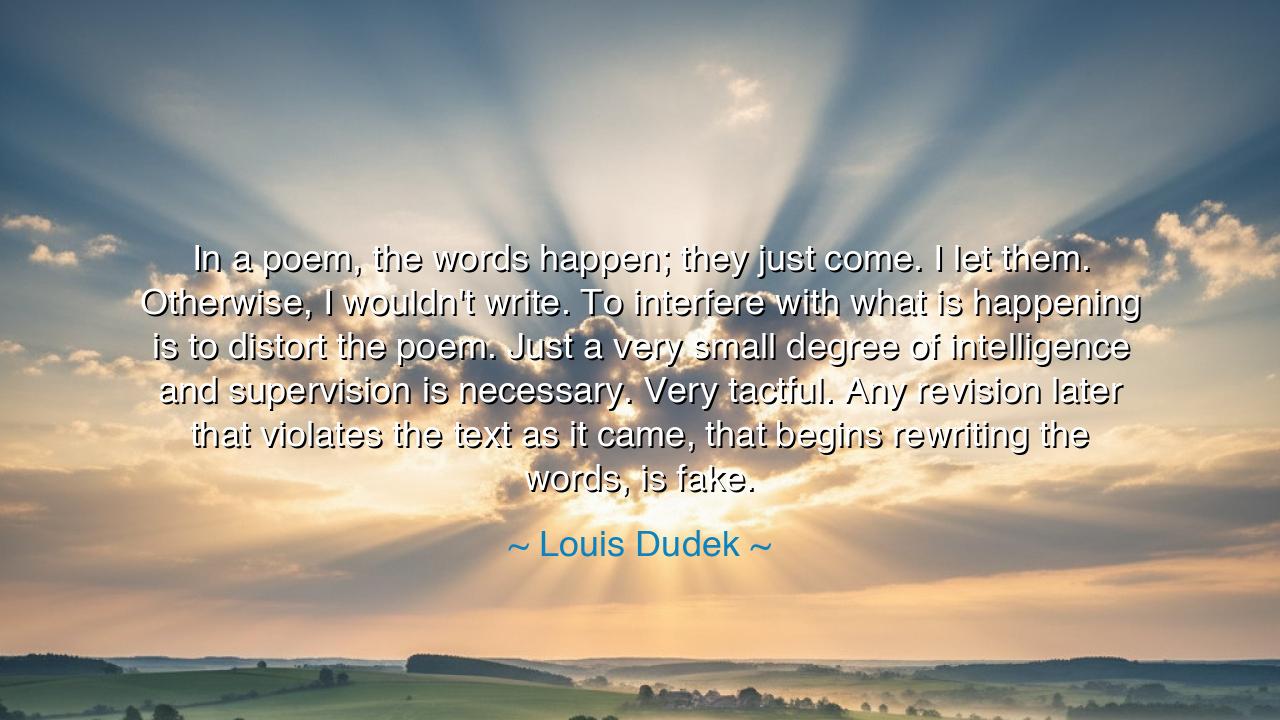
In a poem, the words happen; they just come. I let them.
In a poem, the words happen; they just come. I let them. Otherwise, I wouldn't write. To interfere with what is happening is to distort the poem. Just a very small degree of intelligence and supervision is necessary. Very tactful. Any revision later that violates the text as it came, that begins rewriting the words, is fake.






When Louis Dudek said, “In a poem, the words happen; they just come. I let them. Otherwise, I wouldn’t write. To interfere with what is happening is to distort the poem. Just a very small degree of intelligence and supervision is necessary. Very tactful. Any revision later that violates the text as it came, that begins rewriting the words, is fake,” he was not merely describing the act of writing poetry — he was unveiling a sacred philosophy of creation itself. His words breathe the wisdom of one who has touched the mysterious threshold where thought becomes art, where human consciousness meets the unseen world of inspiration. For Dudek, the poet is not the master of the poem, but its vessel. The poem is not made — it is born.
Dudek, a Canadian poet and teacher of the twentieth century, lived in a time when art was increasingly dominated by form, theory, and analysis. Against this tide of control, he stood as a defender of spontaneity — that divine moment when language arises unbidden, pure, and alive. He believed that a true poem does not come from laboring intellect or artificial design, but from the depths of the unconscious mind, from that secret current where emotion, memory, and mystery intertwine. To “let the words happen” is to trust that current — to surrender the ego and allow the truth within to take its natural shape.
This idea echoes the teachings of the ancients. The Greeks spoke of the Muse, the divine whisperer who gave song and vision to poets. The poet did not invent; he received. Likewise, in the East, sages spoke of the Tao, the flow of life that moves through all things — to force it is to lose it, to surrender to it is to find harmony. Dudek’s words are born of this same spirit. He reminds us that the artist’s wisdom lies in restraint: to guide gently, to listen more than command, to act with “a very small degree of intelligence and supervision.” Like a gardener tending the soil, not dictating the growth, the poet must work with humility before the living force of language.
Consider the story of Samuel Taylor Coleridge and his poem Kubla Khan. Coleridge claimed it came to him in a vision — a dream of a pleasure dome by the sacred river Alph. He wrote in a trance, his hand following the music of the words. But when he was interrupted and the vision broke, he could never finish it. That fragment remains one of the most mysterious poems in English literature — not for its incompleteness, but for its purity. Coleridge did not force it. He understood that what had come was sacred, and that to rewrite or invent an ending would be false. His restraint preserved its authenticity, just as Dudek counseled.
Dudek warns that too much interference — too much intellect, too much editing — corrupts the poem’s soul. When one begins to rewrite from vanity or fear, the poem ceases to be an act of truth and becomes a performance, an imitation of what was once alive. He calls such revision “fake,” for it replaces the living moment with the dead mask of intention. True poetry, he insists, must remain faithful to the instant of its birth, when words arise not from calculation, but from revelation. To violate that moment is to erase the very spark that made it poetry at all.
Yet this teaching extends beyond the art of writing. It speaks to all acts of creation, and indeed, to life itself. Each of us is an artist shaping the poem of our days. The same law holds true: when we try to control every outcome, when we distrust the flow of experience, we distort the natural rhythm of our being. Life, like poetry, demands trust — the courage to let moments unfold without fear, the grace to guide gently but not to force. Spontaneity and faith are the twin wings of creativity; without them, our actions become hollow imitations of what might have been.
So, take this teaching as a compass for both art and existence. When inspiration comes — whether in words, in love, or in the quiet callings of your spirit — do not grasp it too tightly. Let it happen. Guide it with tenderness, but do not cage it with control. When you look back, resist the urge to rewrite what has already been lived; the truth of the moment, however flawed, is more precious than perfection. For the poem of your life, like Dudek’s poem of words, is sacred not because it is flawless, but because it is real — born of the mystery that flows through all things, unforced, unaltered, and utterly your own.






AAdministratorAdministrator
Welcome, honored guests. Please leave a comment, we will respond soon